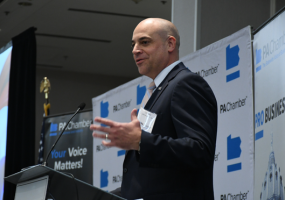 The PA Chamber welcomed Pennsylvania business and political leaders for a breakdown of state and national election results, a discussion of what those results mean for the business community’s future, and opportunities for how to move forward collaboratively at its first-ever Post Election Impact Summit at the Hilton Harrisburg this past Friday.
The PA Chamber welcomed Pennsylvania business and political leaders for a breakdown of state and national election results, a discussion of what those results mean for the business community’s future, and opportunities for how to move forward collaboratively at its first-ever Post Election Impact Summit at the Hilton Harrisburg this past Friday.
The morning began with a comprehensive post-election breakdown led by Susquehanna Polling & Research President Jim Lee, who ran through the numbers proving why voters focused on the economy this election cycle. Among the facts he cited:
- Those with negative views of the economy broke for Trump by large margins;
- While voter turnout was down, Vice President Kamala Harris received more than 10 million fewer votes than President Biden in 2020, while Trump’s votes went up slightly, and he made gains across nearly every demographic group;
- State Treasurer Stacy Garrity was the highest vote getter, and Attorney General-Elect Dave Sunday showed that his record as a successful prosecutor was a winning message needed to secure his victory, as crime was among the top issues driving voters to the polls (along with the economy and immigration).
In describing how the Pennsylvania legislature will keep its exact margins, with a 102-101 Democratic majority in the House and the Senate Republicans maintaining a 28-22 majority, Jim noted that incumbents are harder to beat, but said the polling shows that voters are willing to split their ticket from how they are voting at the top of the ticket.
Following Jim, U.S. Chamber Senior Political Strategist Ashlee Rich Stephenson offered an in-depth breakdown of the national election results and the turnout trends. She weighed in on how the new Trump administration will impact policy at the state and federal level. She also noted that with slim Congressional majorities, she believes there is an opportunity for lawmakers to build consensus on pro-growth policies, reach across the aisle, and get things done. She also shared that in future elections, predictive modeling will play an increasingly important role, as it’s becoming more difficult to predict how races are going to play out solely based on traditional polling.
Former five-term Illinois Congressman (IL-13) turned Head of Government Affairs for the U.S. Chamber Rodney Davis next sat down for a preview of the 119th Congress with PA Chamber President and CEO Luke Bernstein. First, Davis explained how the election process plays out – from certification to when Congress is seated – offering insight from his prior experience as Ranking Member of the Committee on House Administration that certifies elections. He then noted what he thinks led to President-Elect Trump being sent back to the White House this election cycle – noting that attacks on the free market and their failure to land with voters mean it is incumbent on business leaders to spread the message that free enterprise is critical to economic opportunity for American families.
As for the priorities of the new Congress, Davis said he believes efforts to extend the expiring portion of the Tax Cuts and Jobs Act through budget reconciliation will be a top focus, and he believes it will get done in 2025. He also believes that fixing the immigration system will be a top focus, as the existing system takes too long to legally bring people in and costs too much to taxpayers. Davis said he believes that Vice President Harris’s record on energy was critical to her loss, including in all-important Pennsylvania.
The agenda also included a state-focused discussion about legislative priorities in the new session with a bipartisan, bicameral panel of lawmakers: Senator Greg Rothman (R-Cumberland), Senator Anthony Williams (D-Philadelphia), Rep. Tim O’Neal (R-Washington), and Rep. Paul Friel (D-Chester). Together with moderator and PA Chamber Senior Vice President of Government Affairs Alex Halper, the panel discussed bipartisanship and efforts to put political differences aside to work together. They largely agreed on several areas for consensus in the 2025-26 session: economic development, growth in the natural gas industry, infrastructure and transportation, education, workforce development, and housing affordability.
The event ended with a highly anticipated, well-received keynote featuring Attorney General-Elect Dave Sunday, who gave the audience a look into his background and success as a Navy veteran, UPS employee, and District Attorney; and said he is looking forward to working for Pennsylvania in his new role. He said he will be focusing on Artificial Intelligence and AI’s role in crime; working to reform the criminal justice system; and working with the business community.